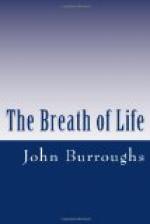II
We can only know, in the scientific sense, the physical and chemical phenomena of life; its essence, its origin, we can only know as philosophy and idealism know them. We have to turn philosophers when we ask any ultimate question. The feeling we have that the scientific conception of life is inadequate springs from the philosophical habit of mind. Yet this habit is quite as legitimate as the scientific habit, and is bound to supplement the latter all through life.
The great men of science, like Darwin and Huxley, are philosophers in their theories and conclusions, and men of science in their observations and experiments. The limitations of science in dealing with such a problem are seen in the fact that science can take no step till it has life to begin with. When it has got the living body, it can analyze its phenomena and reduce them to their chemical and physical equivalents, and thus persuade itself that the secret of life may yet be hit upon in the laboratory. Professor Czapek, of the University of Prague, in his work on “The Chemical Phenomena of Life” speaks for science when he says, “What we call life is nothing else but a complex of innumerable chemical reactions in the living substance which we call protoplasm.” The “living substance” is assumed to begin with, and then we are told that the secret of its living lies in its chemical and physical processes. This is in one sense true. No doubt at all that if these processes were arrested, life would speedily end, but do they alone account for its origin? Is it not like accounting for a baby in terms of its breathing and eating? It was a baby before it did either, and it would seem as if life must in some way ante-date the physical and chemical processes that attend it, or at least be bound up in them in a way that no scientific analysis can reveal.
If life is merely a mode of motion in matter, it is fundamentally unlike any and all other modes of motion, because, while we can institute all the others at will, we are powerless to institute this. The mode of motion we call heat is going on in varying degrees of velocity all about us at all times and seasons, but the vital motion of matter is limited to a comparatively narrow circle. We can end it, but we cannot start it.
The rigidly scientific type of mind sees no greater mystery in the difference in contour of different animal bodies than a mere difference in the density of the germ cells: “one density results in a sequence of cell-densities to form a horse; another a dog; another a cat”; and avers that if we “repeat the same complex conditions, the same results are as inevitable as the sequences of forces that result in the formation of hydrogen monoxide from hydrogen and oxygen.”
Different degrees of density may throw light on the different behavior of gases and fluids and solids, but can it throw any light on the question of why a horse is a horse, and a dog a dog? or why one is an herbivorous feeder, and the other a carnivorous?




